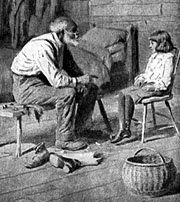 I'm reading G.K. Chesterton's "Napoleon of Notting Hill" for the D.C. Chesterton Society which meets in Sterling, Virginia at Famous Dave's. You can check out their information HERE I'm reading the Dover edition with a New Introduction by Martin Gardner that was published in 1991. The book itself was first published in 1904 and is impossible to classify. It is a kind of humorous romp set in the distant future of 1984, which Gardner speculates may be where George Orwell got the idea for his own title.
I'm reading G.K. Chesterton's "Napoleon of Notting Hill" for the D.C. Chesterton Society which meets in Sterling, Virginia at Famous Dave's. You can check out their information HERE I'm reading the Dover edition with a New Introduction by Martin Gardner that was published in 1991. The book itself was first published in 1904 and is impossible to classify. It is a kind of humorous romp set in the distant future of 1984, which Gardner speculates may be where George Orwell got the idea for his own title.I'm not finished reading it yet, at least this time. I think I read it once before although given the fact that I've read so many accounts of it, I may be mistaken. I was tickled when I encountered a quote from Chesterton I'd see a number of times but hadn't known where it came from in his work.
"If you look at a thing nine hundred and ninety-nine times, you are perfectly safe; if you look at it the thousandth time, you are in frightful danger of seeing it for the first time." (pg. 10) The idea is one I think is all too valuable. We mostly ignore what we see as commonplace. This is built into our psychological makeup. We are much more attuned to the unexpected which stimulates our fight or flight reactions calling for an immediate assessment. But as Chesterton points out quite often, it is the commonplace where wisdom is to be found.
Another quite striking phrase comes a mite later when Auberon Quin, who becomes King, is striving to entertain his companions with pointless jokes and makes the comment: "For there is in me a madness which goes beyond martyrdom, the madness of an utterly idle man." Here I think Chesterton touches on something that has only gotten more pronounced since his time, which was not all that idle by our standards today.
Today our degree of idleness is far greater. Mack Reynolds used to write his science fiction in a universe set in our own time, future for him when he wrote, of "tellie and trank" in which the general populace was mostly idle and passed their time watching television and drugged on "trank", tranquilizers. We're rather close to that situation today empowered at least in part by the emphasis on entitlements and welfare state nannyism. The idleness is bad for the spirit and results in time spend on mindless and often destructive, but good sounding causes, be they environmentalism gone wild, or attacking the system, whatever system you care to attack. Idleness breeds madness. Often enough the fruit of our idle society is a stringy web of madnesses all bundled up into a single destructive strand that erupts into strangeness repeatedly and not limited to the lower classes but just as evident among the idle rich. "Without a vision the people die" is a biblical verse that seems appropriate. What ought our vision to be?

Perhaps you've see the bumper sticker: "Practice Random Acts of Kindness and Senseless Acts of Beauty." Touchi-feelie nonsense is always my reaction. If you think about it, the bumper sticker is an affront. Acts of kindness should not be random but universal as we see to be kind and charitable. A random act of kindness is the act of a scoundrel who is not truly kind. What is a senseless act of beauty? It sounds like a hippie flower child putting a rose in the muzzle of a musket. No act of beauty is senseless and in beauty we see the world as it ought always to be. I think these kind of sentiments are the sentiments of a idle profligacy. In our affluence we have forgotten who we truly are and what we ought to be. The substitutes we make are banal and inadequate. All around us the tide of mediocrity rises so that we will be soon engulfed if we do not stir.
I don't know if that is part of what Chesterton is getting at. I've not yet completed my reading on this outting. Still I've already had much opportunity for thought and pondering Chesterton is a very sensible act of beauty.










No comments:
Post a Comment